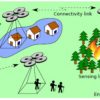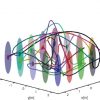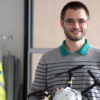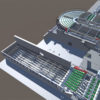Planning the simultaneous movement of multiple agents represents a challenging coordination problem, and ideally safety and efficiency are jointly addressed. In his master thesis, Paul Ladinig developed a planning algorithm for fast and energy-efficient trajectories with reduced collision potential from a start to an end constellation. This new approach combines trajectory approximation based on model predictive control, collision avoidance with potential fields, and flight energy optimization with minimum snap trajectories. This approach results in un-precedented transition times and success rates with less energy consumption, as shown in simulation and real experiments with 16 drones.
This work was jointly co-supervised by Stephan Weiss and Bernhard Rinner and will be presented at ICRA 2021:
- Paul Ladinig, Bernhard Rinner and Stephan Weiss. Time and Energy Optimized Trajectory Generation for Multi-Agent Constellation Changes. In Proceedings of the IEEE International Conference on Robots and Automation (ICRA). Xian, China, June 2021.









